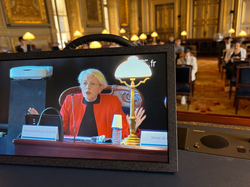The recent news
July 1, 2022
Conferences

♾️follow Marie-Anne Frison-Roche on LinkedIn
♾️subscribe to the Newsletter MAFR Regulation, Compliance, Law
____
► Full Reference: M.-A. Frison-Roche, "Compliance, Artificial Intelligence and Business Management: the right measure" ("Compliance, Intelligence artificielle et gestion des entreprises : la juste mesure"), participation to the Conference coordinated by Mustapha Mekki, L'intelligence artificielle et la gestion des entreprises. July 1st, 2022.
____
🎥 see the conference (in French)
____
consult the slides having been used as brief notes for deliver the lecture (inf French)
____
🚧read the bilingual Working Paper having been used as basis for this conference
____
📝This work will be the basis for an article.
____
► Summary of the Lecture: Of the next European Regulation on artificial intelligence, the European Commission has a quite neutral conception of AI for obtaining a consensus between the Member States, while the Regulators and certain States have a more substantial conception of technology, wanting its power to be used to protect people, firstly from these new tools themselves, secondly from what is an amplification of the evils of the classic world, such as hate or misinformation. This is the reflection of two conceptions of Compliance.
Firstly, Compliance can be defined as neutral processes that increase the effectiveness of what would be the obligation for companies or their desire for efficient risk management (in particular the consideration of "legal risks") to prove being "conform" to all regulations that are applicable to itself and all persons to whom the firm is accountable. This is often referred to as the "compliance obligation" or "obligation of conformity".
This conception implies considerable practical consequences for the company which, in order to succeed in this "total exploit", would then have to resort to artificial intelligence tools constituting a "total and infallible solution", which mechanically generate for it the obligation to "know " all the "regulatory mass", to detect all "non-compliances", to conceive its relationship to the Law in terms of "risk of non-compliance", fully supported by Compliance by Design which could, without human intervention , eliminate legal risk and ensure "compliance total efficiency" in Ex Ante.
The "legal price" of this technological dream is extremely high because all the "regulatory" requirements will then be transformed into obligations of result, any failure generating liability. The Compliance probationary system will become overwhelming for the company, both in terms of burden of proof, means of proof, and transfers, without exemption from proof. Objective responsibilities for others will multiply. The "law of conformity" will multiply Ex Ante systemic penalties, the border with criminal law being less and less preserved.
It is essential to avoid this, both for businesses and for the Rule of Law. For this, we must use Artificial Intelligence to its proper extent: it may constitute a "massive aid", without ever claiming to be a total and infallible solution, because it is the human who must be at the center of the compliance system functioning thank to the firms and not the machinery.
For this, it is necessary to adopt a substantial conception of Compliance Law (and not a sort of Conformity Law or Obedience Law). It does not at all cover all the applicable regulations and it is not at all "neutral", being in no way a series of processes. This new branch of Law is substantially built on Monumental Goals. These are either of a negative nature (preventing a systemic crisis from happening, in many but specific perspectives: banking, financial, health, climate, etc.), or of a positive nature (building a better balance, in particular between human beings, in the company and beyond).
In this conception which appears more and more strongly, artificial intelligence finds its place, more modest. As Compliance Law is based on information, Artificial Intelligence is essential to capture it and make first connections, first stages for successive analyses, done by human beings, making what is essential: the commitment of the company, both by the leaders and by all those who are "embarked" by a "culture of Compliance" which is at both built and common.
This restores the required seal between Criminal Law and what can be asked of the mechanical use of Artificial Intelligence; this puts the obligation of means back as a principle. This restores the principal place to the lawyer and the compliance officer, so that the culture of compliance is articulated with the specificities of a sector and the identity of the company itself. Indeed, the culture of compliance being inseparable from a culture of values, Compliance by design requires a dual technique, both mathematical and legal culture. It is why European Compliance Law, because it is rooted in the European humanist tradition, is a model.
________
For further:
📘Frison-Roche, M.-A. (ed.), Compliance Monumental Goals, 2022
📘Frison-Roche, M.-A. (ed.), Compliance Jurisdictionalisation, 2022
📘Frison-Roche, M.-A. (ed.), Compliance Tools, 2021
📓Frison-Roche, M.-A., L'apport du Droit de la Compliance à la Gouvernance d'Internet, 2019
📕Frison-Roche, M.-A. (ed.), Pour une Europe de la Compliance, 2019
📕Frison-Roche, M.-A. (ed.), Régulation, Supervision, Compliance, 2017
📕 Frison-Roche, M.-A. (ed.), Internet, espace d'interrégulation, 2016
📝 Frison-Roche, M.-A., Compliance Monumental Goals, beating heart of Compliance law, 2022,
📝 Frison-Roche, M.-A., Role and Place of Companies in the Creation and Effectiveness of Compliance Law in Crisis, 2022
📝 Frison-Roche, M.-A., Assessment of Whistleblowing, and the duty of Vigilance, 2022
📝Frison-Roche, M.-A., Drawing up Risk Maps as an obligation and the paradox of he "compliance risks", 2021
__________
June 29, 2022
Interviews

► Référence complète : Frison-Roche, M.-A., Droit à l’avortement : « Le processus de sécession est dans la décision » , Entretien avec Laurence Neuer, Le Point, 29 juin 2022.
____
________
June 29, 2022
Compliance: at the moment

► Référence complète : Frison-Roche, M.-A., Seuls les droits subjectifs techniques ne sont pas touchés par l'arrêt Dobbs: c'est sur eux qu'il faut construire une nouvelle théorie de l'entreprise, 29 juin 2022.
___
► Introduction de l'article : Tout d'abord il y a deux types de réaction possible face à un événement critiquable. Elles peuvent se cumuler mais chacune prend de l'énergie. Soit critiquer l'événement condamnable (puisqu'il est critiquable, renforçant ainsi la mauvaise opinion que l'on a de lui) ; soit en limiter la portée (puisqu'il est critiquable, autant faire en sorte qu'il ait le moins d'effet possible).
Que l'arrêt Dobbs v/ Jackson rendu le 24 juin 2022 par la Cour suprême des Etats-Unis soit critiquable, tout le monde en est à peu près d'accord. Des centaines de commentaires vont dans ce sens ; des milliers de réactions vont dans ce sens. L'on peut continuer à le critiquer. Cela renforce l'opinion que l'on a déjà. Cela prend de l'énergie.
Peut-être vaut-il mieux utiliser son énergie à limiter la portée de cet arrêt. Mettre son énergie dans cet effort-là. Or cet effort en requiert beaucoup. Donc puisqu'il est acquis que cet arrêt est critiquable, concentrons-nous sur les moyens pratiques d'en limiter la portée.
L'on songe à modifier le Droit français en inscrivant le droit à l'avortement dans la Constitution (I). Mais si l'on revient aux Etats-Unis, car l'arrêt de la Cour suprême n'a pas de portée sur le Droit constitutionnel français, il faut mesurer que tous les droits subjectifs "politiques" non-ancrés dans "l'histoire américaine" sont touchés par l'arrêt du 24 juin 2022, la portée de l'arrêt allant bien au-delà du droit à l'avortement (II). La Cour est donc délivrée de la totalité de sa propre jurisprudence, ce que ne sont pas les cours constitutionnelles européennes, et c'est en cela que l'arrêt est catastrophique car non seulement il touche tous les droits subjectifs "politiques", mais il efface toute la jurisprudence de la Cour concernant les droits subjectifs "politiques" que l'on pourrait dire "nouveaux" (III). Plus encore, trois jours après, la Cour suprême a rendu un arrêt concernant un droit politique ancré dans l'histoire américaine, le droit à la liberté d'expression, qu'elle a interprété très largement, pour bloquer le licenciement d'un enseignant sportif d'une école publique qui faisait des prières sur le terrain de sport, procédant ainsi à un revirement de jurisprudence. La Cour ne serait donc pas non plus liée par sa jurisprudence sur les droits subjectifs politiques ancrés historiquement, pouvant les interpréter d'une façon conservatrice, sans "conserver" l'interprétation "progressiste" que la Cour en avait faite (IV). La solution serait donc de travailler sur ce qui reste : les droits subjectifs non-politiques : or, ce sont des droits auxquels les juristes conservateurs, qui dominent la Cour, sont attachés parce qu'ils sont liés à la liberté contractuelle et à la liberté d'entreprendre. Ils seront en mauvaise position pour les restreindre. Cela désigne ceux qui vont devoir, et pouvoir, défendre les femmes, et plus généralement les êtres humains, aux Etats-Unis : les entreprises (V).
____
Lire les développements de l'article ⤵️
June 21, 2022
Interviews

Référence complète : Frison-Roche, M.-A., L'efficacité de la compliance illustrée par l'affaire Youporn, entretien avec Olivia Dufour, 21 juin 2022.
____
____

June 21, 2022
Publications

♾️ follow Marie-Anne Frison-Roche on LinkedIn
♾️subscribe to the Newsletter MAFR Regulation, Compliance, Law
____
► Full Reference: Frison-Roche, M.-A. Compliance, Artificial Intelligence and Business Management: the right measure, Working Paper, June 2022.
____
► Summary of the Working Paper: Of the next European Regulation on artificial intelligence, the European Commission has a quite neutral conception of AI for obtaining a consensus between the Member States, while the Regulators and certain States have a more substantial conception of technology, wanting its power to be used to protect people, firstly from these new tools themselves, secondly from what is an amplification of the evils of the classic world, such as hate or misinformation. This is the reflection of two conceptions of Compliance.
Firstly, Compliance can be defined as neutral processes that increase the effectiveness of what would be the obligation for companies or their desire for efficient risk management (in particular the consideration of "legal risks") to prove being "conform" to all regulations that are applicable to itself and all persons to whom the firm is accountable. This is often referred to as the "compliance obligation" or "obligation of conformity".
This conception implies considerable practical consequences for the company which, in order to succeed in this "total exploit", would then have to resort to artificial intelligence tools constituting a "total and infallible solution", which mechanically generate for it the obligation to "know " all the "regulatory mass", to detect all "non-compliances", to conceive its relationship to the Law in terms of "risk of non-compliance", fully supported by Compliance by Design which could, without human intervention , eliminate legal risk and ensure "compliance total efficiency" in Ex Ante.
The "legal price" of this technological dream is extremely high because all the "regulatory" requirements will then be transformed into obligations of result, any failure generating liability. The Compliance probationary system will become overwhelming for the company, both in terms of burden of proof, means of proof, and transfers, without exemption from proof. Objective responsibilities for others will multiply. The "law of conformity" will multiply Ex Ante systemic penalties, the border with criminal law being less and less preserved.
It is essential to avoid this, both for businesses and for the Rule of Law. For this, we must use Artificial Intelligence to its proper extent: it may constitute a "massive aid", without ever claiming to be a total and infallible solution, because it is the human who must be at the center of the compliance system functioning thank to the firms and not the machinery.
For this, it is necessary to adopt a substantial conception of Compliance Law (and not a sort of Conformity Law or Obedience Law). It does not at all cover all the applicable regulations and it is not at all "neutral", being in no way a series of processes. This new branch of Law is substantially built on Monumental Goals. These are either of a negative nature (preventing a systemic crisis from happening, in many but specific perspectives: banking, financial, health, climate, etc.), or of a positive nature (building a better balance, in particular between human beings, in the company and beyond).
In this conception which appears increasingly strongly, artificial intelligence finds its place, more modest. As Compliance Law is based on information, Artificial Intelligence is essential to capture it and make first connections, first stages for successive analyses, done by human beings, making what is essential: the commitment of the company, both by the leaders and by all those who are "embarked" by a "culture of Compliance" which is at both built and common.
This restores the required seal between Criminal Law and what can be asked of the mechanical use of Artificial Intelligence; this puts the obligation of means back as a principle. This restores the principal place to the lawyer and the compliance officer, so that the culture of compliance is articulated with the specificities of a sector and the identity of the company itself. Indeed, the culture of compliance being inseparable from a culture of values, Compliance by design requires a dual technique, both mathematical and legal culture. It is why European Compliance Law, because it is rooted in the European humanist tradition, is a model.
________
June 19, 2022
Law by Illustrations

► Référence complète : Frison-Roche, M.-A., Phil Spector : Avant tout une fiction ..., qui raconte par les noms et dates précises la préparation du procès de Phil Spector, 2022
____
Qui connait l'histoire et l'industrie de la musique connait Phil Spector, celui qui dans les années 60 fut le plus grand producteur de disques, innova, lança et gagna des fortunes. Puis, il disparut parce que dans un système qui se nourrit de modes l'on disparait aussi ; il resta avec ses souvenirs et son argent. C'est plutôt sous l'angle d'un procès retentissant que les médias lui redonnèrent la couverture, puisqu'il fut poursuivi pour le meurtre d'une actrice. Proclamant d'une façon spectaculaire son innocence, il fût reconnu coupable par le jury et finit sa vie en prison. Lorsqu'il mourut en 2021 en prison à plus de 80 ans, ruiné et seul, la presse titra ainsi : "savez-vous que Phil Spector a été interprété au cinéma par Al Pacino ?".
Car dans l'autre monde qu'est non plus le monde des amateurs de musique mais le monde des amateurs de cinéma, de Phil Spector, l'on n'avait pas entendu parler. Ainsi du film qui sortit en 2013, qui retrace semble-t-il pas à pas les quelques jours précédant sa comparution devant le tribunal, ceux qui admirent celui qui est qualifié de "légende" n'ont pas entendu parlé. Et sans doute les cinéphiles ne connaissent pas cette personne.
Il faut dire que le film débute par cet avertissement : "ce film est une pure fiction qui n'a aucun rapport avec des faits qui se seraient déroulés". Et pourtant le titre même du film est : Phil Spector , c'est-à-dire un titre réduit à l'identification de la personne, pour que nul ne s'y trompe. Les noms sont exacts, les dates aussi, les faits allégués sont reproduits, les lieux également. Les perruques qu'il portait, notamment celle qu'il choisit, ainsi que l'habit, au bouton près, de mettre pour le jour où le procès s'ouvrit.


Pourquoi avoir fait cela ?
Sans doute pour ne pas avoir d'ennui, dans une affaire où la personne concernée fut condamnée pour un meurtre alors qu'il affirmait avoir été témoin d'un suicide. En effet, des personnes avaient par exemple menacé Helen Mirren de s'opposer à l'attribution de toute récompense pour jouer dans un film pour présenter d'une "façon sympathique" un personnage diabolique... L'avantage d'une fiction est qu'on rend moins de compte des personnages qui ne vivraient que sur l'écran....
Pour pouvoir aussi ajouter autant de scènes que l'on veut où le personnage, désormais "de fiction" que serait ce Phil Spector qui n'aurait donc aucun compte à rendre à Phil Spector, peut apparaître dans toute sa démesure et sa rage, notamment contre la justice et la société.
Cela permet au spectateur de voir tout le travail de l'avocate, Linda Kenney Baden, interprétée par Helen Mirren :


L'on peut par exemple y voir les cross-examinations simulés par lesquelles l'avocat prépare le client ou bien, à l'intérieur même du cabinet, la façon dont à tour de rôle les avocats endossent la thèse de l'adversaire.
Dans toutes ces scènes qui furent, dans la "réalité", si théâtrales dans ce procès hors-normes autour d'une personnalité hors-norme, prévenir dans ce film présenté par tous comme une biographie que tout cela ne serait que "fiction" nous montre en tant cas les effets de miroir qu'il existe toujours entre les procès et les films autour de la réalité et le récit qui en est fait.
____
June 15, 2022
Publications

► Full reference : M.-A. Frison-Roche, "Main Aspects of the Book. The Monumental Goals of Compliance Law", in M.-A. Frison-Roche (dir.), Compliance Monumental Goals, Journal of Regulation & Compliance (JoRC) and Bruylant, coll. "Compliance & Regulation", 2023, pp. 13-31
___
► Article summary :This article constitutes the afterword of the book Compliance Monumental Goals.
Its purpose is to show the consistency of the book, in that the Monumental Goals themselves, by their normativity, give Uniqueness to Compliance Law, giving it simplicity and strength.
Restituting each of the contributions and articulating them all in an overall demonstration, this article highlights this consistency of the Compliance mechanisms which join the primary function of the Law: the protection of human beings, now and in the future.
___
📘 Read a general presentation of the book Compliance Monumental Goal, in which the article is published
________
► Read Marie-Anne Frison-Roche's presentations of her other contributions in this book :
📝Definition of Principe of Proportionality and Definition of Compliance Law,
📝 Role and Place of Companies in the Creation and Effectiveness of Compliance Law in Crisis,
📝 Assessment of Whistleblowing and the duty of Vigilance
____
This article is freely accessible.
Read this article ⤵️
June 9, 2022
Conferences

► Référence générale : Frison-Roche, M.-A., Droit de la Compliance et Cloud souverain, in Souveraineté numérique : quelles solutions pour quels problèmes ? , Association Master 2 Droit du Commerce Électronique et de l’Économie Numérique (M2 DCEEN), Université Panthéon-Sorbonne (Paris I), 9 juin 2022, 18h-20h.
____
____
Cette intervention s'insère dans un débat coordonné par la professeure Judith Rochfeld, auquel participent également Monsieur le Député Philippe Latombe et Céline Heller (société Google).
Pour ma part, interrogée en premier pendant un 1/4 d'heure, il s'agissait en premier lieu, avant de participer à la discussion générale, de répondre aux trois questions suivantes :
- Quelles définitions doivent être retenues pour la souveraineté numérique ?
- Quel est le rapport entre souveraineté numérique et droit de la compliance ?
- Plus largement, quelle place le Droit doit-il occuper dans la souveraineté numérique selon vous ?
- En quoi la souveraineté numérique est-elle un but monumental ?
____